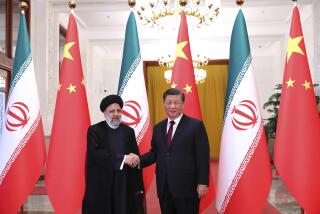China Rejects U.S. Call to Ban Reactor Sales to Iran
- Share via
UNITED NATIONS — China on Monday bluntly rejected an American appeal to ban sales of nuclear reactors to Iran, despite Secretary of State Warren Christopher’s warning that the Islamic government is “too dangerous a country” to be given access to nuclear technology.
With Christopher at his side, Chinese Foreign Minister Qian Qichen told reporters that, if China wishes to sell reactors to Iran, “there is no international law or international regulation or international agreement” to stand in the way.
U.S. officials later acknowledged that Qian was on firm legal ground because the proposed reactors would be delivered under international supervision intended to prevent the diversion of technology for weapons use.
But the officials said that Christopher gave the Chinese diplomat U.S. intelligence reports indicating that Tehran is trying to circumvent the safeguards and develop its own nuclear arsenal.
As an inducement for China to join Washington’s anti-Iran front, Christopher offered to begin U.S.-China talks on ways in which the United States could aid China’s own nuclear power industry--but only if Beijing promises not to sell any sort of nuclear facility to Tehran.
A senior State Department official said Qian agreed to participate in the peaceful nuclear cooperation discussions, an indication that his rejection--delivered before his two-hour meeting with Christopher--may not be China’s last word on the subject.
The U.S.-China dispute marred the opening of a 178-nation conference to renew and, if Washington gets its way, make permanent the 25-year-old Nuclear Non-Proliferation Treaty. It is intended to prevent the spread of nuclear arms beyond the five nations that possessed them in 1970 while assuring countries without weapons access to peaceful nuclear technology.
In a brief welcoming speech to the conference, Christopher said the treaty, known as the NPT, “is truly one of the most important treaties of all time.”
“Many of the NPT’s achievements cannot be quantified--the weapons not built, the nuclear materials not diverted and the wars not started,” he said. “(But) the NPT has kept the number of nuclear powers far lower than initially forecast. . . . It has reduced the risk of nuclear conflict.”
Vice President Al Gore will deliver the U.S. policy address Wednesday. But it is no secret that Washington’s objective for the conference--scheduled to run through May 12--is unconditional, permanent extension of the treaty provisions. A majority vote of the 178 participants is enough to renew the pact. If the treaty is not renewed, it will expire this year.
Christopher’s emphasis on Iran in his talks with Qian demonstrated the extent of Washington’s determination to keep Iran out of the nuclear weapons club. Russia has agreed to sell Iran nuclear technology worth about $1 billion, a deal the United States has worked furiously--and so far unsuccessfully--to prevent. U.S. officials believe that if the Russian sale goes through, Iran would not need Chinese technology.
But if Moscow reconsiders, China would become the last possible supplier. All the major Western suppliers already have refused to consider sales to Iran. Although Russia insists it will go ahead with the deal, some U.S. officials believe Iran may lack the hard currency needed to pay for it. China, whose economy is stronger than Russia’s, might be able to extend credit.
China’s nuclear power industry, however, is less sophisticated than Russia’s. China has produced its own nuclear weapons, but Beijing has been meticulous in meeting its obligations not to sell nuclear arms. And its reactor technology may fall short of what Iran wants.
Christopher also met Monday with representatives of Southeast Asian and Arab governments. Although U.S. officials described the talks as friendly, Christopher received no new commitments to support indefinite extension of the NPT.
As the conference opened, participants had not decided on how the renewal vote will be taken. The United States wants a public ballot to allow Washington to determine how successful its lobbying has been. But some smaller countries want a secret ballot that lets them cast their vote without having to consider its impact on their relations with the United States.
The conference seems to be working like a magnet to bring countries into the nuclear non-proliferation camp. In the last two months, half a dozen more countries have signed the treaty, bringing total membership to the current 178, just seven fewer than the full membership of the United Nations.
More to Read
Sign up for Essential California
The most important California stories and recommendations in your inbox every morning.
You may occasionally receive promotional content from the Los Angeles Times.













